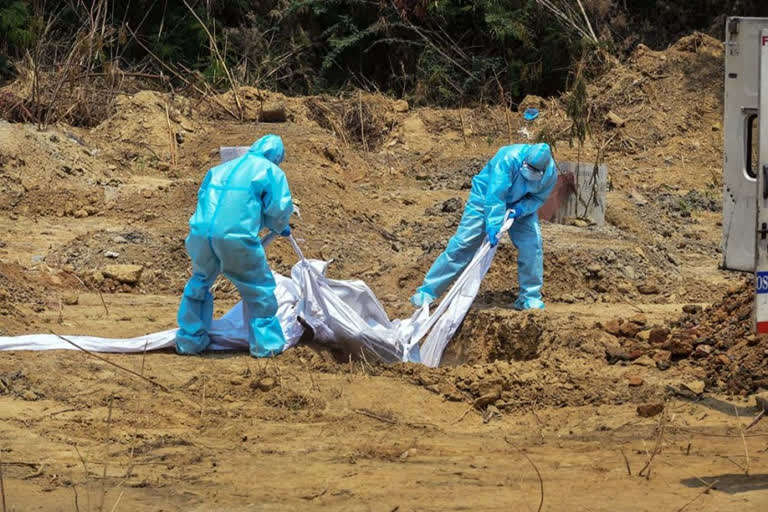Hyderabad: Several reports of mistreatment of dead bodies of Covid-19 patients have come to the fore ever since the outbreak of the infection, be it the incident wherein the dead body of a 72-year-old coronavirus patient was shifted to the crematorium from his house in an earthmover in Andhra Pradesh, the visuals showing Kolkata Municipal Corporation staff dragging bodies by hooks into transport vans, or a viral video in which health workers in Puducherry can be seen throwing a dead body into a pit.
These incidents are a reflection of blatant disregard for a dead person's rights enshrined in Article 21 of the Indian Constitution which guarantees protection of life and personal liberty.
This right to life and personal liberty mentioned in the article is, however, not just limited to a person while he/she is alive but even after his/her death.
This was articulated by the Supreme Court in Parmanand Katara (Pt.) v. Union of India in response to a petition that challenged the method of execution of the death sentence by hanging under the Punjab Jail Manual as inhuman and violative of Article 21 of the Constitution. The Apex court held, “We agree with the petitioner that right to dignity and fair treatment under Article 21 of the Constitution of India is not only available to a living man but also to his body after his death”.
The State is obliged under Article 21 to ensure proper disposal of a dead body with a decent and dignified cremation/burial in accordance with the religious beliefs of the person.
Right of the dead explicitly stated in our laws
- Section 297 of the Indian Penal Code - Trespassing on burial places, etc.
Whoever, with the intention of wounding the feelings of any person, or of insulting the religion of any person, or with the knowledge that the feelings of any person are likely to be wounded, or that the religion of any person is likely to be insulted thereby, commits any trespass in any place of worship or on any place of the sepulchre, or any place set apart from the performance of funeral rites or as a depository for the remains of the dead, or offers any indignity to any human corpse, or causes disturbance to any persons assembled for the performance of funeral ceremonies, shall be punished with imprisonment of either description for a term which may extend to one year, or with fine, or with both.
International covenants and laws on rights of the dead -
- Article 16 of Geneva Convention, 1949:
Article 16 of states, “As far as military consideration allow, each party to the conflict shall facilitate the steps taken to protect the killed – against ill-treatment.”
- Australia’s Defence Force Manual, 1994
It states, “The remains of the dead, regardless of whether they are combatants, non- combatants, protected persons or civilians are to be respected, in particular their honour, family rights, religions convictions and practices and manners and customs at all times they shall be humanely treated.”
Also read: Bihar shelter home cases: Recommended action against erring govt servants, CBI tells SC
- The UK Military Manual, 1958
It states “The dead must be protected against maltreatment.”
- 2005 resolution of the United Nations Commission on Human Rights
The 2005 resolution on human rights and forensic science underlined the importance of dignified handling of human remains, including their proper management and disposal as well as of respect for the needs of families.



